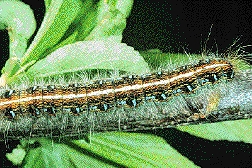
News Update - May 24, 2001 Lexington, Kentucky - Tonight laboratory experts confirmed that liver enzymes which indicate cyanide poisoning were confirmed in pathology analyses of aborted fetuses and foals. The main suspect for the cyanide source remains the Eastern Tent Caterpillar combined with the cyanide in wild cherry tree leaves containing more cyanide than normal because of the freeze after record high temperatures in mid-April. Still unknown is exactly how the caterpillar cyanide gets into the pregnant mares. While scientists begin more tests on pasture grasses, Lexington horse breeders are going to cut down wild cherry trees near their pastures and spray the Tent Caterpillar moths before they lay eggs that would hatch next spring.
Click here to subscribe and get instant access to read this report.
Click here to check your existing subscription status.
Existing members, login below:
© 1998 - 2026 by Linda Moulton Howe.
All Rights Reserved.

